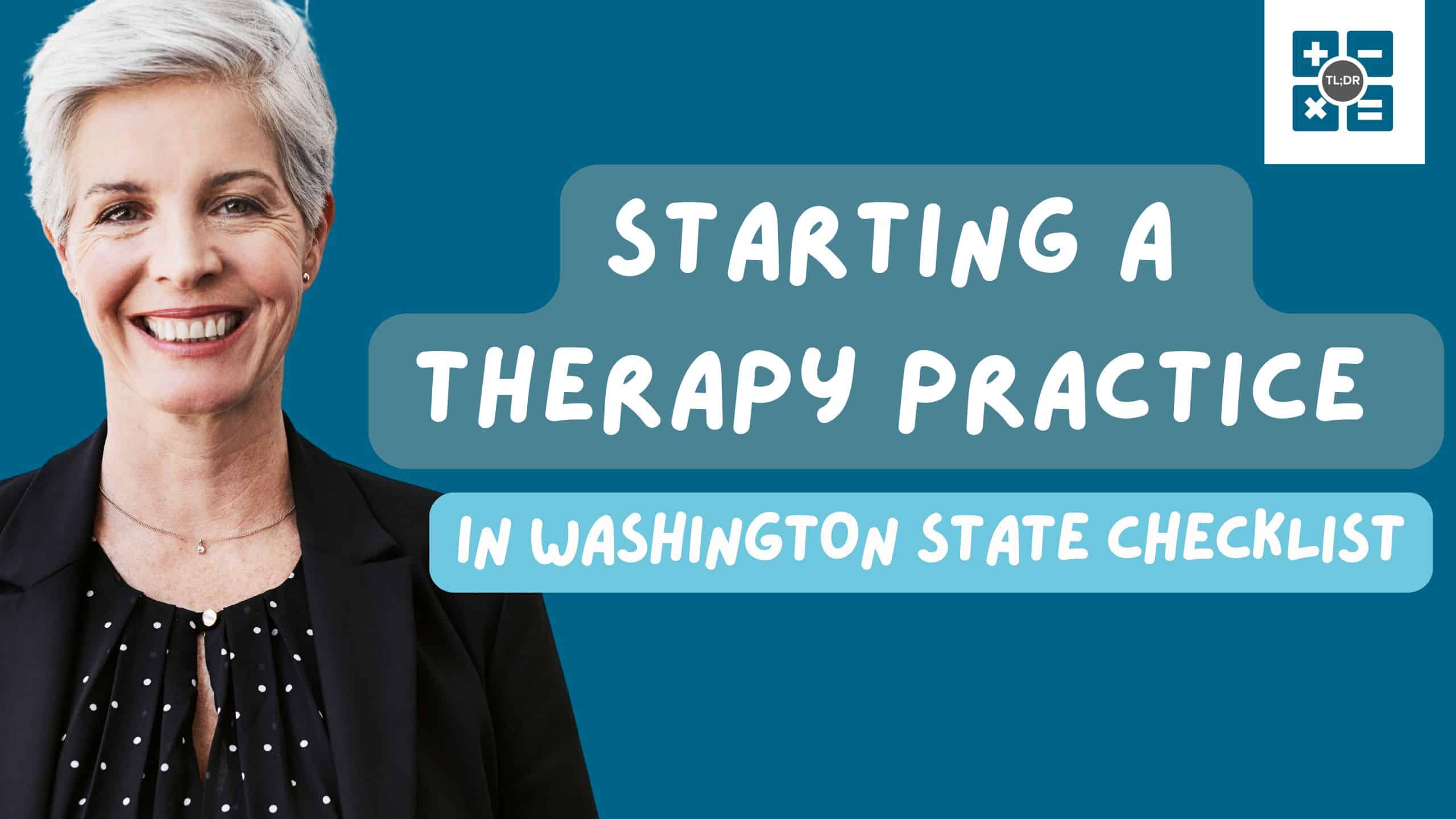Starting a therapy practice, like any new business, comes with its share of challenges. Navigating the legal and administrative requirements on your own can feel overwhelming, especially if you’re unfamiliar with the process. But with the right guidance, you can turn this daunting task into a smoother experience.
If you’re ready to take on the challenge of building your therapy practice in Washington State, here’s a checklist of the essential steps to get you started.
Licensing
Before you start your practice and register the business, you need to secure your therapy practice license first. Licensure is the first step if you’re not yet a licensed mental health practitioner. Visit the Washington State Department of Health website to learn more about the application process and requirements. The application fee for an initial license is $191.
What if you’re a licensed mental health practitioner already but not in the State of Washington? You don’t need to apply for a license again. In this case, you can apply for licensure reciprocity. Here’s where it gets a bit tricky. The State of Washington can accept your current license if:
- You come from a state where licensing for mental health professionals is “substantially equivalent” to the licensing in the State of Washington and;
- You have helped a license in the past twelve months.
There are only 11 states that were deemed “not substantially equivalent” to Washington. For more information about other states, here’s the Scope of Practice Analysis for Mental Health Counselors. These states are as follows:
| Arkansas | Michigan |
| Iowa | Minnesota |
| Maine | Mississippi |
| Wisconsin | Missouri |
| Nebraska | New Jersey |
| South Carolina |
States With Reciprocity
The other 39 states not enumerated above can have reciprocity for licensure in the State of Washington. However, you will only be given a probationary license that’s good for one year and renewable for another year. You can practice your profession even with a probationary license, but you’re expected to complete and meet differences in education, experience, or examination for the State of Washington.
Once you’ve met the missing requirements to fully comply with the State of Washington, you’ll now be issued with a full, permanent license to practice as a mental health counselor.
States Without Reciprocity
If your state doesn’t have reciprocity with the State of Washington, that’s a bummer, right? But don’t be discouraged because there’s still a way around in starting a therapy practice. It would just require more work on your part. Here’s the deal. You have three options:
Associate Licensure Path:
You can apply for an associate license while you work on the requirements. As an associate, you need to work under supervision. In this path, you may need to finish additional coursework and meet a certain number of clinical hours.
Full Licensure Path:
This path means directly applying for a full license. Hence, you’ll not work as an associate under supervision here. In this path, you’ll submit all requirements to the Washington State Department of Health, and they’ll evaluate your credentials. They may require you to take additional coursework to meet the educational requirements of Washington. Moreover, if you’re already a well-experienced mental health counselor in another state, they may not require you to take supervised clinical hours. But if your experience is inadequate, you’ll need to take a couple of clinical hours to meet that. Once you complete and meet all the requirements, you’ll be issued a full license.
Business License and Registration
Assuming you already secured a probationary or full license, you can now start business registration. First, you need to think of a “trade name.” In Washington, the trade name is simply the business name. It can be your name (e.g., John Smith) or a unique name (e.g., JS Therapy Clinic).
In Washington, you can select any of the following business structures:
- Sole Proprietorship: Ideal for solo therapists; simple but with personal liability.
- General Partnership: Best for starting with a business partner who shares responsibilities and liabilities.
- Corporation: Suited for large-scale therapy businesses with multiple locations or therapists.
- Limited Liability Companies (LLCs): A flexible option combining partnership simplicity with corporate liability protection.
- Not-for-Profit Corporation: Great for practices focused on charitable or humanitarian work.
- Limited Partnership (LP): Partners can have limited liability, but at least one must fully manage and be liable for the practice.
- Limited Liability Partnerships (LLPs): Similar to a general partnership, all partners have limited liability protection.
In our expert opinion, LLCs are the best business structure for medical practitioners because they protect you from personal liability in case the business fails. You can fill out the LLC registration form here. The cost of registration is $200. For more information, you can ask the Washington Secretary of State for other concerns.
Aside from that, you might need to apply for an Employer Identification Number (EIN) if you plan on hiring employees. You can check the Washington State Department of Revenue website for more details about securing a business license.
Insurance
As a medical professional, Washington also requires you to have professional liability insurance or medical malpractice insurance in your field. The cost of insurance may differ depending on the insurer. In the State of Washington, the average cost of insurance is $66 per month.
Let’s Build Your Therapy Practice in Washington
Starting a therapy practice is a bold move, but navigating the licensing and paperwork shouldn’t slow you down. At TL;DR Accounting, we empower therapy practice owners to master their finances and streamline operations, ensuring your practice thrives from the start. Let us take care of the accounting and compliance so you can focus on what you do best—helping your clients.
Take control of your practice’s future. Contact TL;DR Accounting today, and let’s get your journey started!





